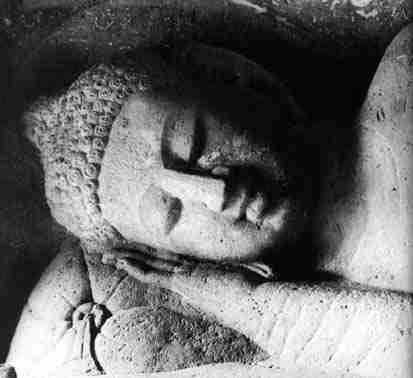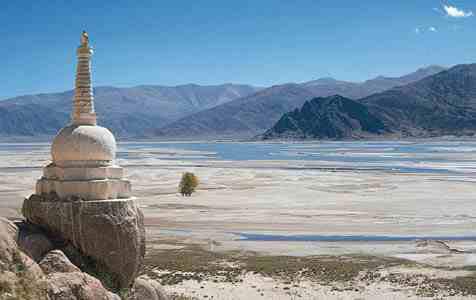There has been one particular aspect at the core of Buddhist philosophy whose logic I have felt uncomfortable with from the very beginning. I hoped that as I gradually diminish my ignorance of Buddhist philosophy through learning more about it, this philosophical concern will be cleared up and settled. Quite the opposite has happened instead. I feel there is a philosophically unresolved matter concerning one of core tenets of Buddhism. This article is intended as a little provocation, and I would be interested in how most of you reconcile this dogmatic loose end.
This will not be a problem for those that have taken it on faith – a position I respect and admire. Faith is quite a powerful phenomenon – some of us however are not privileged with its possession, and are somewhat doomed to be searching for answers.
The question is of the ‘continuum of consciousness’ and subsequent re-births within sa?s?ra. According to most Buddhist schools, consciousness is the aggregate that transmigrates from life to life. There are a few persisting questions, which I have not found satisfactory answers for, since the answers either belong to the family of classical open questions of philosophy which absorbed Western Philosophy for millennia, or they appear inconsistent with other Buddhist core tenets.
Firstly I don’t see how can consciousness traverse ‘lifetimes’, and secondly I find as inconclusive the assertion that consciousness could not have had a beginning (i.e. tenet of beginningless cyclic existence).
I will exemplify the explanations I’ve come across thus far in reading His Holiness’ Dalai Lama’s book Becoming Enlightened. I’m aware that this is a text intended for the Western viewer to popularize Buddhism, so one shouldn’t expect thorough, deep and profound analyses. But still, the arguments can be evaluated based on their quality regardless of the intended demographic.
In the context of Karma, the ‘stream of essential causes’ of consciousness is placed as an analogue to the material and efficient causes resulting in their product – a body. The only difference is that the body comes from an aggregate of atoms (which are not bodies), yet somehow consciousness is not considered in a similar manner i.e. being brought into existence via preceding causes – instead it always persisted. It is concluded without argument that ‘Mindless matter cannot become conscious’.
And again without further argument, aside from past life recollection instances (which may be some empirical evidence to a faithful Buddhist, but certainly not amounting to a proof), it is concluded that the stream of consciousness couldn’t have had a beginning because that would imply that it had to have been produced from some ‘mindless state’, which clearly is absurd. I’m not convinced. This argument is in a way similar to the Ex Nihilio Nihil Fit principle – nothing comes from nothing. The only difference (fundamental) here is that given the reasonable logical strength of this principle, the argument in defence of the impossibility of going from non conscious to conscious is a lot weaker since we’re dealing with a attribute of being (namely consciousness), and not being per se. Hence resorting to this line of argumentation doesn’t work.
Even when used in its full force, the Ex Nihilio Nihil Fit principle, in various versions of the Cosmological Argument at best establishes (without consensus among philosophers) that being is necessary. So my point is that in order for this line of argument to work we would have to first argue for the cyclic nature of being itself, and once that is established demonstrate a similar nature to entities within it, or certain properties of being – not the other way around, arguing from a property of being (consciousness is an attribute of being – no?) and concluding that being has no beginning.
The only part of the discourse in the book that contains something akin to an argument (yet it is only an echo of what has been stated before) is a quote from the Indian logician Dharmakirti:
Because the non-conscious cannot be the essential cause of consciousness,
The beginninglessness of cyclic existence is established.
This is an empirical open question (as mentioned above) and is certainly weaker then the ex nihilio assertion (and even that is questioned by some). It is an open question if the universe has been and/or will be temporally infinite. No deductive argument has conclusively stated otherwise, and our empirical pursuits are limited by their inductive nature.
Then, and finally is the issue of transmigration of the ‘consciousness aggregate’ through the cycle of existence. The Dalai Lama puts it as follows: ‘With consciousness proceeding in a continuous stream, death is like changing clothes when the present body can no longer be maintained’. That is ‘the self’ is reborn, as stated earlier in the book.
Now, Buddhists maintain that the self is an illusion, and all we have is dependent arising. Hence the self does not in fact exist in and of itself. If this is true, then supposedly a self that has been fashioned by the idiosyncratic make up of some particular (human) form needs to be tied to it like the projection to a projector – once the projector is gone, so is the projection – the erroneous belief that it is an independent entity. I cannot see how this empty illusion can re-emerge in another form. And why do we even entertain the notion of essential causes? I cannot think of anything more contradictory to the doctrine of emptiness.
I’m willing to accept the idea that it is not The self that is reborn, but A self which is form-specific.
I hope my arguments haven’t, aside from possibly revealing my ignorance, exasperated my dear readers too much. And if it is exasperation that was needed to force you to reflect and rethink your views then, hopefully it was a fruitful exasperation. I am attracted to Buddhist practice and wonderful benefits flowing from it, as I am basically an adept of N?g?rjuna’s doctrine. I have adopted those practices and views, and see them as both self evident and liberating. The doctrine of the re-births, however, I regard as a difficult catch-22 acquired from the mythology-saturated cultures in whose wombs ancient Buddhism had been developing.













